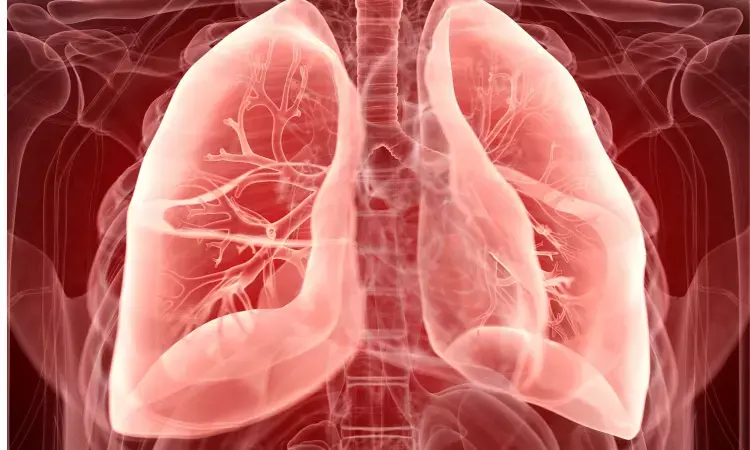- Home
- Medical news & Guidelines
- Anesthesiology
- Cardiology and CTVS
- Critical Care
- Dentistry
- Dermatology
- Diabetes and Endocrinology
- ENT
- Gastroenterology
- Medicine
- Nephrology
- Neurology
- Obstretics-Gynaecology
- Oncology
- Ophthalmology
- Orthopaedics
- Pediatrics-Neonatology
- Psychiatry
- Pulmonology
- Radiology
- Surgery
- Urology
- Laboratory Medicine
- Diet
- Nursing
- Paramedical
- Physiotherapy
- Health news
- Fact Check
- Bone Health Fact Check
- Brain Health Fact Check
- Cancer Related Fact Check
- Child Care Fact Check
- Dental and oral health fact check
- Diabetes and metabolic health fact check
- Diet and Nutrition Fact Check
- Eye and ENT Care Fact Check
- Fitness fact check
- Gut health fact check
- Heart health fact check
- Kidney health fact check
- Medical education fact check
- Men's health fact check
- Respiratory fact check
- Skin and hair care fact check
- Vaccine and Immunization fact check
- Women's health fact check
- AYUSH
- State News
- Andaman and Nicobar Islands
- Andhra Pradesh
- Arunachal Pradesh
- Assam
- Bihar
- Chandigarh
- Chattisgarh
- Dadra and Nagar Haveli
- Daman and Diu
- Delhi
- Goa
- Gujarat
- Haryana
- Himachal Pradesh
- Jammu & Kashmir
- Jharkhand
- Karnataka
- Kerala
- Ladakh
- Lakshadweep
- Madhya Pradesh
- Maharashtra
- Manipur
- Meghalaya
- Mizoram
- Nagaland
- Odisha
- Puducherry
- Punjab
- Rajasthan
- Sikkim
- Tamil Nadu
- Telangana
- Tripura
- Uttar Pradesh
- Uttrakhand
- West Bengal
- Medical Education
- Industry
Sputum NGAL levels representative of airway inflammation in respiratory diseases

Sputum NGAL levels indicated a clinically distinguishable ACO from asthma to COPD. According to a recent study published in the Journal of the Association of Physicians of India, this biomarker is associated with airway inflammation in various respiratory disorders.
Researchers in a recent study assessed sputum NGAL levels as a tool for discerning ACO from asthma to non-ACO COPD. Those with a history of both asthma and COPD features were represented by the global term ACO.
Asthma COPD overlap (ACO) is a consensus-based phenotype. It has characteristics of both COPD and asthma. It is more important to distinguish ACO from other diseases since it is related to low health-related quality of life, increased exacerbation and hospital admission rate, rapid lung function deterioration, and increased morbidity and mortality. Biomarkers need to be developed because they cannot be diagnosed explicitly based on spirometry tests, patient demographics, radiology, or by-sputum cytology.
Considering this, researchers assessed the role of sputum neutrophil gelatinase-associated lipocalin (NGAL) as a biomarker of ACO, the correlation between sputum NGAL levels with forced expiratory volume 1 (FEV1) and exacerbation rate in ACO and the correlation between sputum NGAL level with sputum neutrophils and eosinophils in ACO.
The study had 180 subjects, and there were four groups with 45 patients, each with asthma, COPD, ACO, and healthy nonsmokers, respectively.
The key results of the study are:
- Researchers found high sputum NGAL levels in ACO cases, followed by the COPD group and the
Asthma group (last).
- Nonsmokers had lower readings compared to the diseased.
- Out of three-receiver operating characteristic (ROC) figures, the validity of NGAL was better in selecting patients of ACO than COPD and asthma.
- ACO had the highest area under the curve (AUC) and less than the acceptable limit for the remaining two.
- For ACO, the NGAL cut-off value of 2473 pg/mL had sensitivity and specificity of 80% and 50 %, respectively.
Researchers investigated the sputum NGAL levels as a biomarker in ACO identified by the syndromic approach.
Sputum NGAL was supportive of a clinically differentiating ACO from asthma to COPD. This is a biomarker associated with airway inflammation in airway diseases.
Further reading:
BDS, MDS in Periodontics and Implantology
Dr. Aditi Yadav is a BDS, MDS in Periodontics and Implantology. She has a clinical experience of 5 years as a laser dental surgeon. She also has a Diploma in clinical research and pharmacovigilance and is a Certified data scientist. She is currently working as a content developer in e-health services. Dr. Yadav has a keen interest in Medical Journalism and is actively involved in Medical Research writing.
Dr Kamal Kant Kohli-MBBS, DTCD- a chest specialist with more than 30 years of practice and a flair for writing clinical articles, Dr Kamal Kant Kohli joined Medical Dialogues as a Chief Editor of Medical News. Besides writing articles, as an editor, he proofreads and verifies all the medical content published on Medical Dialogues including those coming from journals, studies,medical conferences,guidelines etc. Email: drkohli@medicaldialogues.in. Contact no. 011-43720751


